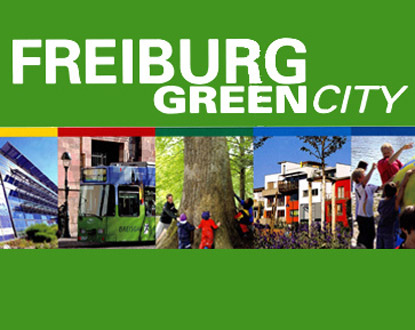Freiburg, in Germany, is considered the number one green-city in Europe, the ecological city of sustainable development and post-oil era. However, this city is not a phalanstery of utopians but rather a wealthy city with employment opportunities and wealth generation. Here, a solid, cultured, and pragmatic bourgeoisie is in charge. The Mayor is Dieter Salomon, the first ‘Grünen’ to govern a sizable German city. But the key to success is the people’s adherence to this model of development and quality of life.
Because the moral is always the same: top-down decisions lead nowhere.
It may not be by chance that Freiburg was the city where Erasmus of Rotterdam lived and where philosophers Martin Heidegger, Edith Stein, and Walter Benjamin worked. Some intellectual legacies leave their mark.
It is also the city where Wolfgang Schäuble was born, the current Federal Minister of Finance in Chancellor Angela Merkel’s government, the successor of Helmut Kohl, who is probably the person to whom the defense and very existence of the euro is owed, standing against the intransigent hawks and euro-skeptics.
The city’s economic development is ensured by 1,200 green economy companies that employ 12,000 people.
The quality of life is reflected in the numbers: while in Germany, 67% of people prefer cars as their mode of transport, it’s 50% in Freiburg.
In fact, one-third of trips are made by public transportation (many trams and a few buses), one-third by bicycle, and only the remaining third by cars with massive use of car-sharing.
But the real challenge is indicated on the ‘bluespot’ placed on the Rathaus (Town Hall): Zero CO2 by 2050!!!
There is much to consider and emulate.
-Freiburg has specialized in issues related to sustainable development. It’s a capital of ecology, a pioneer in solar and energy-efficient architecture.
It hosts one of the main European factories for photovoltaic panel production, and one of the towers in the city center is entirely covered on one facade with photovoltaic panels.
The city has also implemented incentive-based operations promoting ‘soft transport’ options, and a transport hub has been constructed. Located near the train station and a tramway station, it includes a parking lot for private vehicles, a parking and maintenance workshop for bicycles, a bike rental point, and a café with a terrace.
The city center is reserved for pedestrians and served by trams. Bicycles are so numerous that they are even prohibited in certain streets.
-The Vauban district of Freiburg, is the world’s first eco-district. Built in 1996 on a disused French military base, it has become a global showcase for best practices in sustainable urban development. The challenges of this district were to emphasize ecology and social aspects. However, it has now become an important tourist attraction for the district’s brand image.
The historic center is largely made up of cobblestone pedestrian streets. Notably, there are small canals (Freiburger Bächle) fed by the Dreisam River (flowing further south). This 15 km long network used to carry drinking water and aid in firefighting. No longer in use, part of these canals has been preserved for tourism, as a unique feature of the city.


